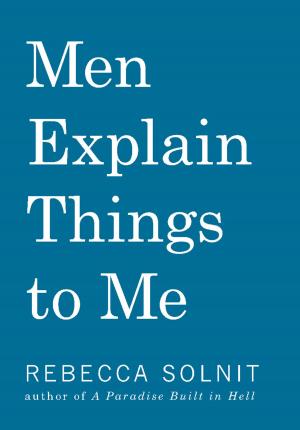Call Them by Their True Names
American Crises (and Essays)
Nonfiction, Social & Cultural Studies, Social Science, Gender Studies, Feminism & Feminist Theory| Author: | Rebecca Solnit | ISBN: | 9781608469475 |
| Publisher: | Haymarket Books | Publication: | September 4, 2018 |
| Imprint: | Haymarket Books | Language: | English |
| Author: | Rebecca Solnit |
| ISBN: | 9781608469475 |
| Publisher: | Haymarket Books |
| Publication: | September 4, 2018 |
| Imprint: | Haymarket Books |
| Language: | English |
“Rebecca Solnit is essential feminist reading.” —The New Republic
“Solnit’s exquisite essays move between the political and the personal, the intellectual and the earthy.” —Elle
Rebecca Solnit is the author of more than twenty books including the international bestseller Men Explain Things to Me. Called “the voice of the resistance” by the New York Times, she has emerged as an essential guide to our times, through incisive commentary on feminism, violence, ecology, hope, and everything in between.
In this powerful and wide-ranging collection of essays, Solnit turns her attention to the war at home. This is a war, she says, “with so many casualties that we should call it by its true name, this war with so many dead by police, by violent ex-husbands and partners and lovers, by people pursuing power and profit at the point of a gun or just shooting first and figuring out who they hit later.” To get to the root of these American crises, she contends that “to acknowledge this state of war is to admit the need for peace,” countering the despair of our age with a dose of solidarity, creativity, and hope.
“Rebecca Solnit is essential feminist reading.” —The New Republic
“Solnit’s exquisite essays move between the political and the personal, the intellectual and the earthy.” —Elle
Rebecca Solnit is the author of more than twenty books including the international bestseller Men Explain Things to Me. Called “the voice of the resistance” by the New York Times, she has emerged as an essential guide to our times, through incisive commentary on feminism, violence, ecology, hope, and everything in between.
In this powerful and wide-ranging collection of essays, Solnit turns her attention to the war at home. This is a war, she says, “with so many casualties that we should call it by its true name, this war with so many dead by police, by violent ex-husbands and partners and lovers, by people pursuing power and profit at the point of a gun or just shooting first and figuring out who they hit later.” To get to the root of these American crises, she contends that “to acknowledge this state of war is to admit the need for peace,” countering the despair of our age with a dose of solidarity, creativity, and hope.















